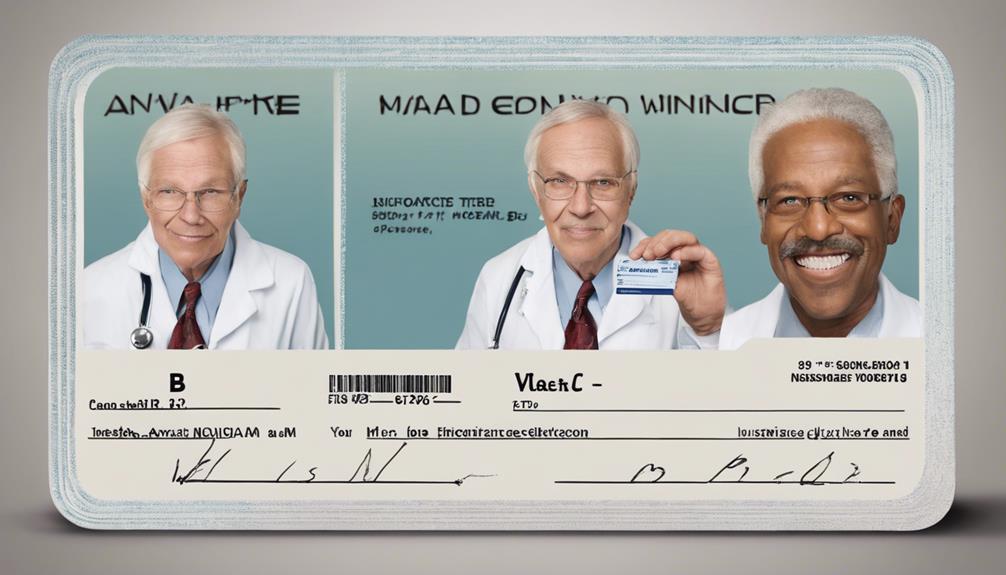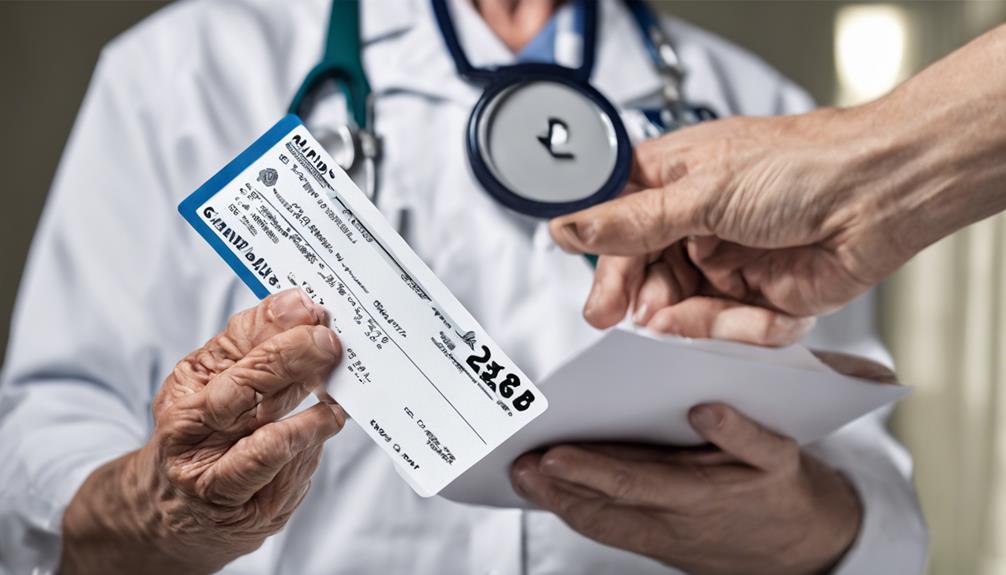We recently discovered that individuals who meet certain qualifications may be eligible for help from Medicaid to cover the costs of Medicare Part B premiums.
However, the question remains – will Medicaid truly pay for our Medicare Part B premium?
Let's explore the eligibility requirements, the relationship between Medicaid and Medicare, and the process of applying for this assistance.
Understanding these key points can shed light on how Medicaid may indeed help alleviate the burden of Medicare Part B costs for those in need.
Understanding Medicaid and Medicare Relationship
In our examination of the relationship between Medicaid and Medicare, it becomes clear that Medicaid plays a crucial role in alleviating financial burdens for eligible individuals by assisting with the payment of Medicare Part B premiums. For those with limited income, the Medicaid program steps in to provide much-needed help in covering the costs associated with Medicare.
Through initiatives like the Medicare Savings Program (MSP) and State Medical Assistance (Medicaid), individuals facing financial constraints can receive the necessary assistance to ensure they can afford their Medicare Part B premiums.
Understanding this intricate relationship between Medicaid and Medicare is essential for those seeking to navigate the complexities of the healthcare system. By recognizing the support available through Medicaid for Medicare Part B premiums, eligible individuals can access the vital health insurance program they need without facing overwhelming financial strain.
This assistance not only eases the financial burden on beneficiaries but also guarantees they can maintain their healthcare coverage without disruption.
Coverage Options for Medicare Part B Premium

Navigating the interconnected landscape of Medicaid and Medicare reveals crucial coverage options for managing Medicare Part B premiums, particularly through programs like the Medicare Savings Programs (MSPs). When considering coverage options for your Medicare Part B premium, it's essential to understand the following:
- Medicare Savings Programs (MSPs): These programs are designed to assist low-income individuals with Medicare costs, including covering the Part B premium. By enrolling in MSPs, eligible individuals can receive Medicaid assistance to pay for their Part B premium, helping them save money.
- Coverage Criteria: Eligibility for Medicaid assistance with the Medicare Part B premium is determined based on income and resource limits established by the state. Meeting these criteria is vital to qualify for support through MSPs.
- Enrolling in MSPs: To benefit from Medicaid assistance with your Part B premium, individuals must enroll in the Medicare Savings Programs. This process allows eligible participants to have their Part B premium covered, easing financial burdens related to healthcare expenses.
Eligibility for Medicaid Payment of Part B Premium
Exploring eligibility requirements for Medicaid payment of the Medicare Part B premium involves meeting specific income and resource criteria set by individual states. Each state administers its Medicaid program differently, so the income levels and guidelines for Medicaid assistance with Part B premiums can vary.
Some states automatically cover the Part B premium for people enrolled in both Medicare and Medicaid, while others may require individuals to apply for assistance based on their income. Eligibility for this assistance is primarily determined by income level, and states may pay either the full or a portion of the Part B premium for those who qualify for both programs.
It's essential to contact your State Medicaid office to understand the specific requirements in your state. This way, you can determine how Medicaid can help pay for your Medicare Part B premium, ensuring you have access to necessary health insurance coverage, including prescription benefits.
How to Apply for Medicaid Assistance

To apply for Medicaid assistance to help cover your Medicare Part B premium, one must meet the specific income and resource criteria established by their state. When considering how to apply for Medicaid assistance, follow these steps:
- Check Income Eligibility: Understand the income limits set by your state for Medicaid assistance. This includes not only your income but also any assets or resources you may have that could affect eligibility.
- Review Residency Requirements: Ensure you meet your state's residency requirements, as these can vary. Some states may allow you to 'spend down' excess income to qualify for Medicaid assistance.
- Contact State Medicaid Office: Reach out to your State Medicaid office for detailed information on how to apply for assistance with your Medicare Part B premium. They can guide you through the application process and provide clarity on any questions you may have.
Considerations for Dual Enrollees in Medicaid and Medicare
Considering the complexities of dual enrollment in Medicaid and Medicare, understanding the implications of overlapping coverage is crucial for managing healthcare expenses effectively. Dual enrollees have the advantage of leveraging both Medicaid and Medicare to cover their healthcare costs comprehensively. One key benefit is the potential assistance with the Medicare Part B premium through the Medicare Savings Program (MSP). Medicaid acts as secondary insurance, bridging the gap to cover expenses that Medicare may not, including Part B premiums. For individuals with limited income and resources, Medicaid's support with Part B premiums can offer significant financial relief, ensuring access to necessary healthcare services without incurring high out-of-pocket expenses.
| Medicaid Benefits for Dual Enrollees | Details |
|---|---|
| Coverage of Part B Premium | Medicaid may assist with Part B premiums through MSP. |
| Financial Relief | Medicaid's support with premiums provides relief for those with limited income. |
| Comprehensive Coverage | Dual enrollment offers extensive coverage for healthcare expenses. |
Frequently Asked Questions
How Do You Get Your Medicare Part B Paid For?
To get your Medicare Part B paid for, you may qualify for assistance through programs like MSP, if eligible. These programs cover Part B premiums for individuals with limited income and resources.
Secure financial relief by enrolling in MSP, potentially having Medicaid cover your Part B premium. Contact your State Medicaid office to assess eligibility and alleviate financial stress associated with Medicare Part B costs.
Who Is Eligible for Medicare Part B Premium Reimbursement?
Eligibility for Medicare Part B premium reimbursement is typically extended to individuals enrolled in both Medicare and Medicaid. This reimbursement assistance can significantly reduce out-of-pocket expenses for beneficiaries. State-specific criteria and programs may influence eligibility, with some states automatically covering Part B premiums for those who are dually eligible.
Contacting State Medicaid offices is crucial to gain insights into the specific requirements and application processes for this reimbursement.
Who Is Exempt From Paying Medicare Part B Premiums?
Absolutely, individuals who qualify for the Qualified Medicare Beneficiary (QMB) program are exempt from paying Medicare Part B premiums. This program, part of the Medicare Savings Program (MSP), assists low-income Medicare beneficiaries by covering expenses like Part B premiums.
Those who meet the QMB criteria don't have to worry about those premiums. It's a relief for many in need of financial assistance with their healthcare costs.
Who Doesn't Pay Medicare Part B Premiums?
We qualify for assistance with Medicare Part B premiums if we meet certain income and resource criteria. This assistance is crucial for ensuring continued access to our Medicare benefits.
Those who are eligible for programs like the Qualified Medicare Beneficiary (QMB) initiative under Medicaid don't pay Part B premiums. This safety net ensures that low-income individuals don't face financial barriers when it comes to accessing necessary healthcare services.
Conclusion
In conclusion, Medicaid can be a lifeline for those struggling to pay their Medicare Part B premiums. It's like having a guardian angel swoop in to ease the burden of healthcare costs.
By understanding the relationship between Medicaid and Medicare, exploring coverage options, and meeting eligibility requirements, individuals can access the support they need.
So don't let financial worries hold you back from getting the care you deserve – Medicaid may just be the key to unlocking a healthier future.









